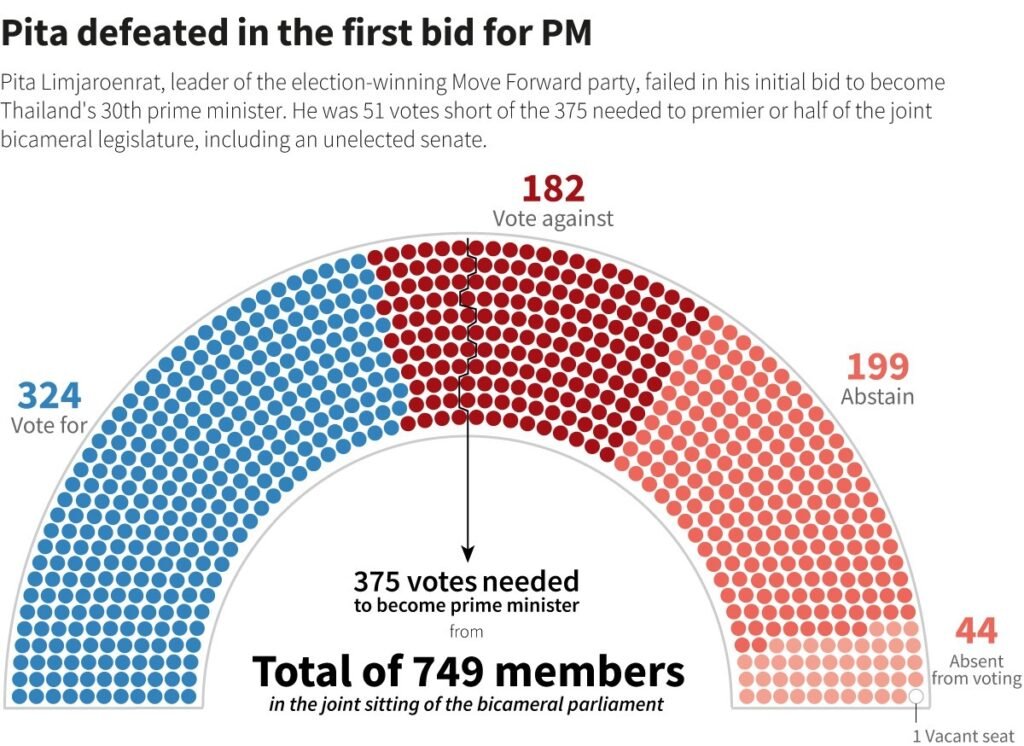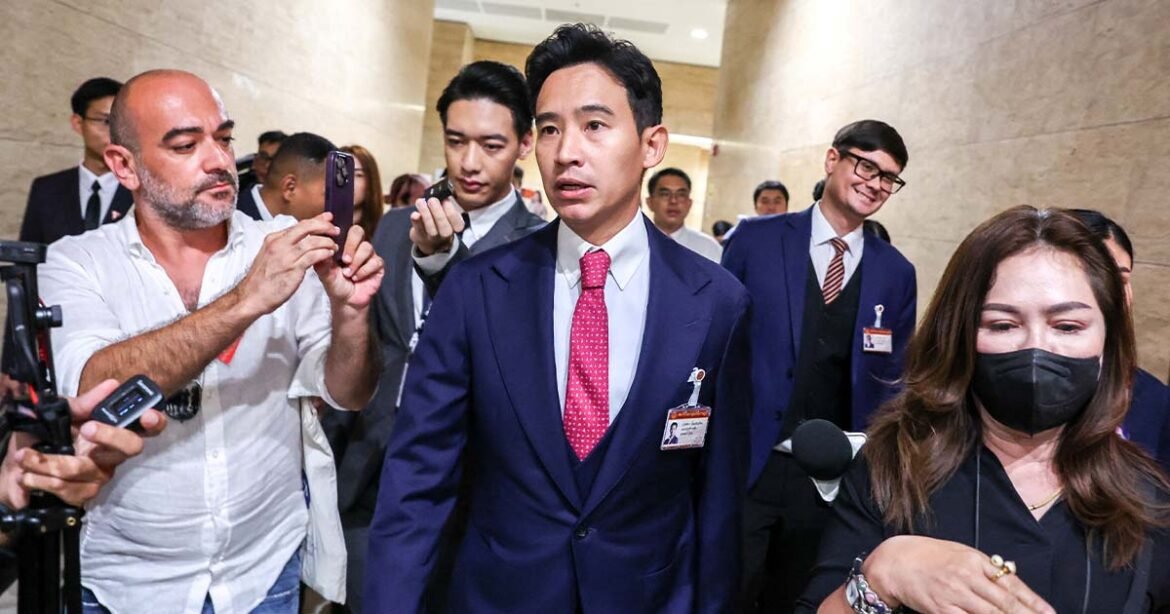Pita Limjaroenrat, the leader of the Thai election-winning party, failed to get prime ministerial support to become the next prime minister of Thailand on 13 July 2023. Pita Limjaroenrat has emerged as a prominent political figure, leading the progressive Move Forward Party (MFP). The party’s recent electoral success, only two months ago, was driven by its strong commitment to initiating comprehensive reforms.
You Can Also Read: HOW DID YOUNG THAIS CHANGE THE ELECTION OUTCOME?
However, due to the impact of the 2014 military coup, changes to election regulations were implemented. Now, in order to secure the esteemed position of prime minister, Pita faces the formidable task of obtaining the support of a parliamentary majority. Despite not encountering direct opposition, Pita fell short of the necessary approval from over half of the parliament, as numerous lawmakers either abstained or voted against him.
Pita faces challenges in gaining prime ministerial support
During the general election held two months ago, the MFP secured 151 seats out of 500 in the House of Representatives. By forming a coalition alliance with seven other parties, they obtained a solid majority of 312 seats in the House. However, in order to become the prime minister, Pita needs the support of at least 375 lawmakers out of the total 749 in the bicameral parliament. Pita faces his greatest obstacle in the Senate, which leans conservative, as the majority of its 249 members oppose the MFP’s reformist agenda.
The Move Forward Party has emerged as a source of hope for many Thais who desire progressive change. Their vision encompasses advocating for social justice, implementing economic reforms, and reducing military influence in politics. They have also expressed their intention to address the lese majesty laws, which have been criticized for suppressing free speech and dissent. Pita’s leadership has resonated particularly well with young voters, who constitute a significant portion of the MFP’s core supporters. His charismatic personality and unwavering commitment to challenging the existing system have earned him a devoted following. However, as the recent parliamentary vote demonstrated, gaining support from both houses remains an arduous task.

Conservative concerns over MFP’s reforms and legal challenges
In addition to being outnumbered in the legislature, Pita confronts additional obstacles on his path to power. The notoriously conservative Constitutional Court is currently evaluating two complaints against him, including one alleging that he owns stock in a defunct media company. The other complaint asserts that MFP’s proposal to modify the draconian royal defamation laws, which have imprisoned hundreds of monarchy critics, constitutes an attempt to overthrow Thailand’s entire political system.
In response to these allegations, Pita argued in parliament that he remained qualified to serve as prime minister. He also sought to assuage concerns among royalists by expressing his confidence in the future of the Thai monarchy. However, he voiced his apprehension that both the institution and the lese majesty law were being exploited for political gain.
Pita asserted that certain groups were attempting to impede his progress because they stood to lose personal benefits. He noted that these same individuals had previously used the rule of law as a pretext to resist change. Moreover, he emphasized the need for a mature approach to address this issue at its core, which involves refraining from employing the monarchy in political conflicts and finding a way to maintain a harmonious relationship between the king and the people in the evolving context of a modern democratic society.
Public discontent grows with uncertain future
The recent events in parliament have raised concerns about public discontent and frustration. Observers warn that democracy might be compromised if participants prioritize interests other than the will of the people. Signs reading “senators don’t vote against the people’s will” and “respect my vote” have been seen among crowds assembled in central Bangkok, indicating potential unrest if Pita does not win the upcoming poll.
Younger generations, in particular, have been vocal about their dissatisfaction with the current state of affairs. They yearn for greater transparency, accountability, and inclusivity in governance. If the political impasse continues, it could exacerbate tensions and lead to more significant protests.
A visiting fellow at the ISEAS-Yusof Ishak Institute, Napon Jatusripitak, has warned that the recent events in parliament have the potential to “ignite substantial frustration and discontent among the public,” especially among those who believe that the exercise of democracy has been compromised by participants or organizations that seem to emphasize interests other than the popular will.
What’s next?
The Thai parliament is expected to hold another vote next week, giving Pita a chance to contest if nominated again.
Following the voting, Pita made a statement in which he acknowledged the outcome but vowed to continue fighting. He then expressed gratitude for the 13 votes cast by “brave” senators who “represent [the] voice of the people. “I get that there’s a lot of pressure on them, and that there are a number of incentives that prevented them from voting in accordance with the people. But I won’t give up; I’ll just have to think of a new plan.”
With Pita’s initial bid for prime minister falling short, his coalition partner, the Pheu Thai Party, faces the decision of supporting him in the next ballot on July 19 or proposing an alternative candidate. The country, which has experienced a history of coups and political turmoil, may face weeks of impasse and economic anxiety if a leader is not chosen promptly. Meanwhile, caretaker Prime Minister Prayut Chan-o-cha has announced his departure from politics once a new leader is chosen.
As Thailand navigates its way through these challenging times, finding a middle ground that accommodates both progressive reforms and traditional values becomes essential. Dialogue and compromise between the opposing factions could pave the way for meaningful changes while ensuring stability and unity in the country. Upholding the principles of democratic governance, respecting the rule of law, and safeguarding the rights of all citizens are paramount in the journey towards a more inclusive and prosperous Thailand.
The international community is also closely monitoring the developments in Thailand. As a regional leader and a popular tourist destination, Thailand’s political stability and adherence to democratic norms have broader implications for Southeast Asia.
In conclusion, Pita Limjaroenrat’s bid for the position of prime minister has confronted considerable obstacles. Although the Move Forward Party’s vision for progressive change has attracted many supporters, opposition from conservative factions and legal obstacles have complicated its path to leadership.


